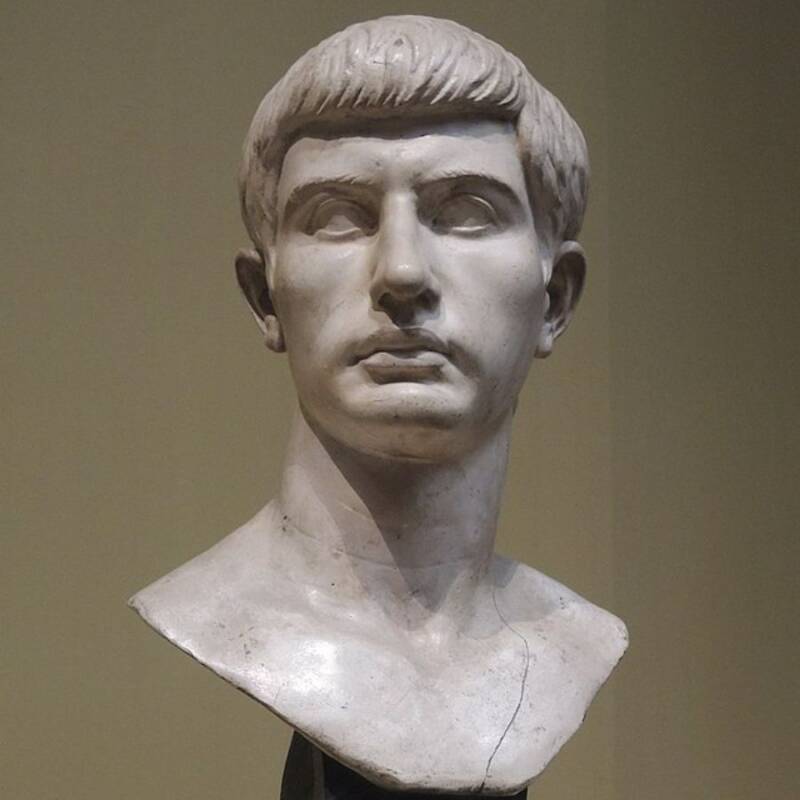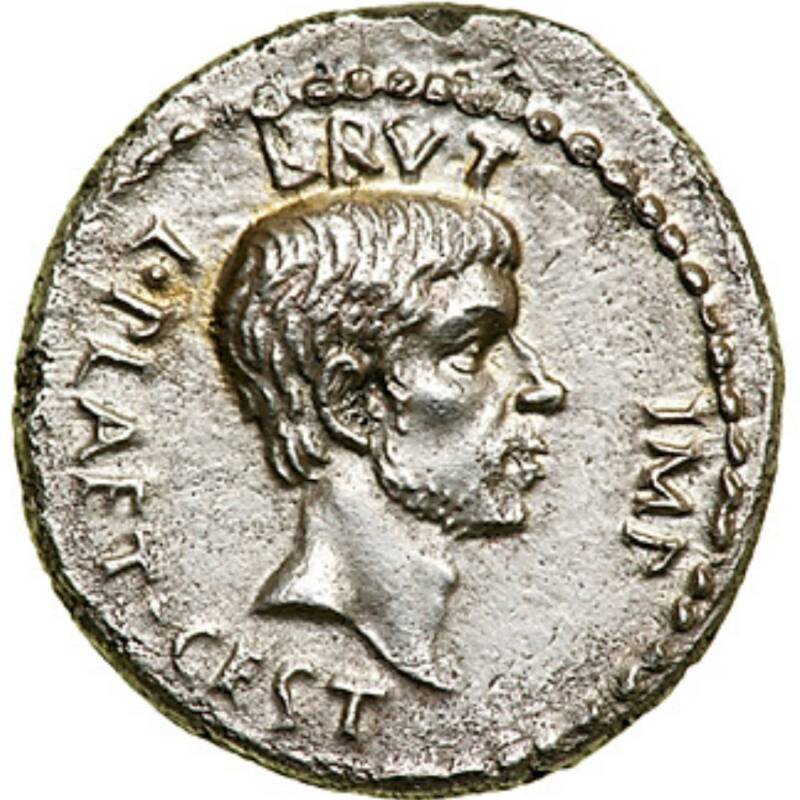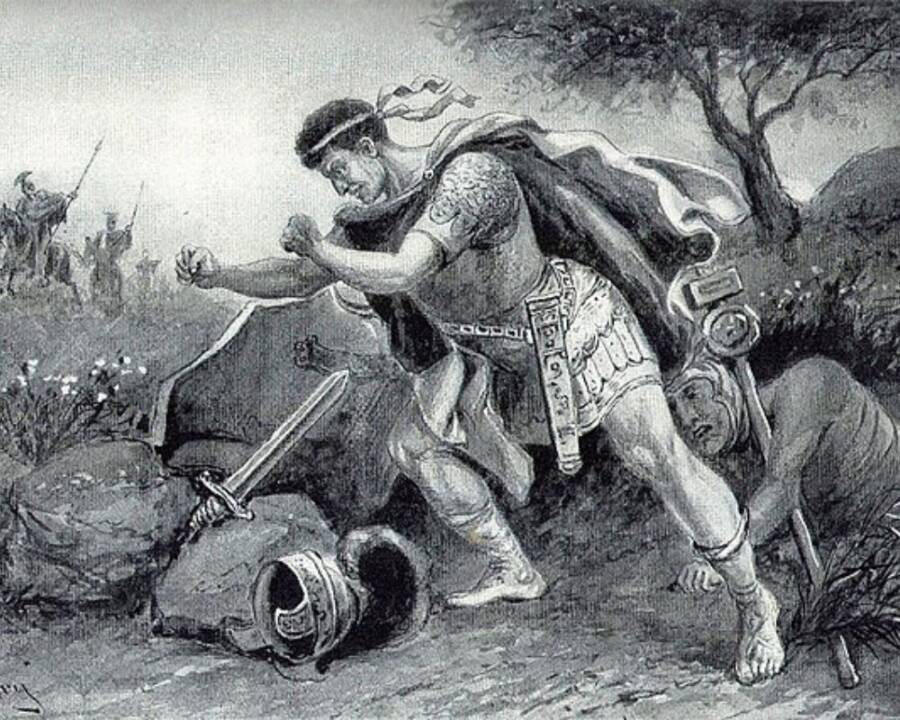Before Brutus' name became synonymous with the betrayal of Julius Caesar, Roman republicans sang his praises as a hero of democracy.

Wikimedia CommonsA bust that’s presumed to be of Marcus Junius Brutus, widely known as the man who helped kill Julius Caesar.
Marcus Junius Brutus was a renowned Roman politician and a brilliant orator. Born into an illustrious family of politicians, Brutus held a series of government appointments throughout his career, and he even became one of the closest confidants of Gaius Julius Caesar.
But today, Brutus isn’t remembered for any of his myriad political accomplishments. Rather, his name has become synonymous with being a traitor — one who would sell out his family, his friends, and his country in pursuit of a bigger goal.
In fact, his name would become so connected with ignominy that he died by suicide at just 42 years old, unable to deal with the fallout from a move that he thought was his best effort at saving the democracy he loved so much.
Let’s take a look at what really happened between Brutus and Caesar and question whether equating his name with treachery is fair after all.
The Early Life Of Marcus Junius Brutus
While his exact date of birth is unknown, historians tend to agree that Marcus Junius Brutus was born around 85 B.C.E. in ancient Rome. According to Encyclopedia Britannica, he was part of the gens Junia, a family of orators and politicians who worked tirelessly to ensure that Rome would never again have a king. Instead, they preferred to practice the principles of democracy in an elective republic.
His father, with whom he shared a name, was murdered by the Roman general and statesman Gnaeus Pompeius Magnus, better known as Pompey the Great. This resulted in Brutus being raised by his uncle, Cato the Younger. His mother, Servilia — who would go on to become one of Caesar’s lovers — also came from a distinguished political family.
One of Servilia’s ancestors, Servilius Ahala, murdered the would-be Roman dictator Spurius Maelius in 439 B.C.E. Because of his family’s history, Brutus was raised to value democracy and anti-tyranny above all else.

Public DomainBrutus had the Eid Mar (Ides of March) coin minted to celebrate the assassination of Julius Caesar.
Throughout his career, Marcus Junius Brutus served in many important roles. These included stints as the triumvir monetalis (essentially, a money-changer — one who converts the plundered treasures of the empire into useable money) and as a quaestor (a public official).
He also had a relatively normal private life, at least by Roman standards. His first marriage to Appius Claudius Pulcher’s daughter, Claudia, helped his political career. His second marriage to Porcia (sometimes spelled Portia), the daughter of Cato and his first cousin, was potentially born out of a genuine desire to be with her.
But in 49 B.C.E., civil war broke out in Rome. Brutus was then presented with a choice: team up with Pompey, who had brutally murdered his father, or team up with Julius Caesar, who was his mother’s lover. The answer, as far as he was concerned, was obvious — but it would ultimately prove to be a fateful decision.
Brutus’ Role In The Assassination Of Julius Caesar
At the beginning of the Roman civil war, Brutus took Pompey’s side. As far as he was concerned, Pompey was fighting to maintain the integrity of the Republic, while Caesar was fighting for selfish and personal reasons. But when it became clear that Pompey was losing, Brutus quickly defected to Caesar’s side — and Caesar welcomed him.
“Caesar wanted someone with the reputation of Brutus on his side, because it gave him a form of legitimacy,” said Kathryn Tempest, a historian who wrote Brutus: The Noble Conspirator, to HowStuffWorks. “Caesar could say that his side was standing up for the Republic.”

Wikimedia CommonsThe Assassination of Julius Caesar by William Holmes Sullivan. 1888.
Ultimately, though, it would prove to be a fatal mistake for both men. While Caesar roundly defeated Pompey, it wasn’t long before he made his true intentions known. No longer interested in ruling Rome as a republic, Caesar made clear that his ultimate goal was to pursue a kingly title — and that was something that Brutus would not stand for.
On March 15, 44 B.C.E., Brutus teamed up with a group of senators to assassinate Caesar, stabbing the dictator 23 times on the Senate floor. According to The Parallel Lives by Greek historian and philosopher Plutarch, the moment was so chaotic that Brutus suffered a cut on his own hand.
If you believe Shakespeare, Caesar’s final words were, “Et tu, Brute?” But according to the historian Suetonius, who wrote two different versions of Caesar’s death, the fallen leader was likely silent in the face of treachery. Plutarch noted that Caesar attempted to fight back against his assailants at first, but once he saw Brutus coming at him with a dagger, he pulled his robe over his head and gave up, dying silently.
Regardless of the details of Caesar’s final moments, news of the assassination spread quickly. And once the citizens of Rome found out about their beloved leader’s death, Brutus had to flee to Macedonia to escape the outrage.
The Complicated Modern Legacy Of This Once-Lauded Leader
Brutus may have thought he was saving the Republic, but the assassination of Caesar plunged Rome into a series of civil wars. After suffering several rounds of defeat, Brutus ultimately died by suicide in October of 42 B.C.E.
It didn’t take long for Brutus’ dreams of a democratic Rome to die with him. In 27 B.C.E., Augustus Caesar was installed as the first emperor of Rome, and the Roman Empire ruled for centuries thereafter.

Wikimedia CommonsBrutus reportedly threw himself onto his own sword after losing the second battle of Philippi in 42 B.C.E.
Ultimately, Tempest says there’s no unanimous consensus on how historians view Brutus. Some see him as a well-meaning but foolhardy idealist, committed to defending democracy against all odds. Others, however, remember him as a traitor — betraying the most mighty of men in pursuit of infamy of his own.
However you choose to view Brutus, however, what’s clear is that his name will forever be recorded in the annals of history as a man who wanted to live as a hero but instead died a traitor.
Now that you’ve read all about Brutus, learn about Locusta of Gaul, Nero’s personal executioner. Then, read about the Roman emperor Caligula, who was likely nowhere near as sadistic as everyone thinks he was.





